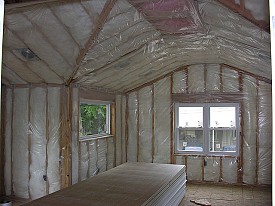Garage Insulation: The Surprising Energy Saver
 At an average size of 400 square feet, your garage is an important part of your property. Not only does it shelter your vehicle from weather extremes and would-be thieves, it most likely multitasks. The typical American garage does double duty as a workshop, craft room, man cave, music studio (ever wondered where the term "garage band" originated?), or private storage unit.
At an average size of 400 square feet, your garage is an important part of your property. Not only does it shelter your vehicle from weather extremes and would-be thieves, it most likely multitasks. The typical American garage does double duty as a workshop, craft room, man cave, music studio (ever wondered where the term "garage band" originated?), or private storage unit.
The only problem is that throughout much of the country, garages tend to be freezing in winter and broiling in summer. Find out why adding insulation to your garage can be an excellent energy-wise move.
Advantages of Garage Insulation: For You
Simply put: when your garage is insulated, you'll be more comfortable working or playing in there, no matter what the season. In addition, if your garage is attached to your home, you will also be preventing the loss of heat or air conditioning from the rest of your living space. And if you are the proud owner of a FROG (furnished room over the garage), insulation will help make the HVAC in that area perform better as well. The end result is greater comfort for you and your family, together with lowered utility bills.
Advantages of Garage Insulation: For Your Belongings
Now it could be that you're in the minuscule percentage of homeowners or renters who never utilize the garage for anything except parking the car and storing household possessions. Even this type of usage can benefit from insulation, though. Both frigid and sultry air can be rough on your vehicle; a dead battery may result in either case. Ditto for sensitive objects you have stashed in the garage. Extremely high temperatures will damage such things as canned goods, wine, and medication, for example. Other stored items like house paint and electronic equipment can be equally affected by heat or cold.
Insulating Threshold and Walls
If you'd like the quickest fix available to insulate your garage, try one of the kits for weather stripping the garage door threshold. These are easy to apply and will keep out drafts, rain, or snow, and even fallen leaves or other debris. In addition, if they weren't already insulated by the original builder, you can apply insulation to the walls and ceiling of your garage, plus the access door leading into your home, as a DIY project.
Insulating the Garage Door
One Caveat: Although you may hear about using readymade kits to insulate garage doors -- or applying foam board as an even cheaper alternative -- be cautious. Your garage door is quite different from any other type of entrance in your home. It is controlled by torsion springs under high tension, precisely adjusted for the door's existing weight. The addition of insulation and its extra poundage can cause a dangerous imbalance. For safety's sake, hire a professional to insulate your door. Of course, when you are in the market for a garage door replacement (their average lifespan is about 30 years), it's worthwhile to look for an energy efficient, pre-insulated model.
Laura Firszt writes for networx.com.
Updated October 30, 2018.
Looking for a Pro? Call us (866) 441-6648

Garage door Average Costs
Garage Door Pros Experiences

A Tile Grouting Job Well Done!!

Bathroom Ceiling Painting And Repair Required By Mortgage Lender



